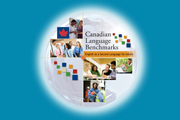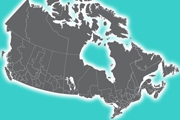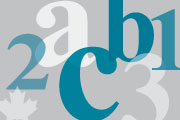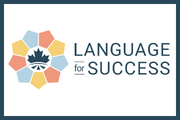
Glossary
Skills for Success defines adaptability as the ability to achieve or adjust goals and behaviours when expected or unexpected change occurs, by planning, staying focused, persisting, and overcoming setbacks.
The CLB are recognized as the official Canadian standards for describing, measuring and recognizing the language proficiency of adult immigrants and prospective immigrants in both English and French.
Using examples from Language for Succes (LFS), learners are able to describe what they can do. The purpose of these statements is to make LFS user-friendly and accessible.
Skills for Success defines collaboration as the ability to contribute and support others to achieve a common goal.
Skills for Success defines communication as the ability to receive, understand, consider, and share information and ideas through speaking, listening, and interacting with others.
The ability to understand and communicate messages effectively and appropriately for different contexts. This ability requires an integration of language knowledge, skills and strategies.
A competency is the ability to do something efficiently or successfully. Instructors use competency statements to observe, measure and assess performance.
CCLB defines these as broad, universally relevant purposes of language use. The CLB competency areas include: Interacting with others; Comprehending or giving instructions; Getting things done; Reproducing information (writing only), and Comprehending or sharing information.
Skills for Success defines creativity and innovation as the ability to imagine, develop, express, encourage, and apply ideas in ways that are novel, unexpected, or challenge existing methods and norms.
Skills for Success defines digital as the ability to use digital technology and tools to find, manage, apply, create and share information and content.
English as an Additional Language
English as a Second Language
These were the skills originally identified as the skills needed to work successfully in Canada. Skills for Success is an expanded and revised document based on national and international research.
A framework that supports language, workforce, and workplace training design and instruction. It draws on the Canadian Language Benchmarks (CLB) to provide insight into the language needed to demonstrate the nine Skills for Success (SFS).
The core language skills of Communication, Reading and Writing in LFS. The framework shows the relationship between SFS and CLB levels.
Online self-directed learning activities designed for LFS. These activities demonstrate how LFS can be used by learners or instructors. They span a variety of skills and levels/stages.
Learners in language programs or workplace training programs who have literacy needs. They may have interrupted education and may not be fully literate in any language.
The six “other” (non-language) skills of Adaptability, Collaboration, Creativity and Innovation, Digital, Numeracy and Problem Solving which are often used in combination with language skills.
Skills for Success defines numeracy as the ability to find, understand, use, and report mathematical information presented through words, numbers, symbols, and graphics.
An OLA defines the CLB levels required to perform tasks related to specific jobs as defined in the Essential Skills Profiles and additional information found in the National Occupational Classifications (NOC).
This term was used with the old Essential Skills that were replaced by SFS. It meant that the CLB level fell below the ES scale. Features were extrapolated from the CLB to present characteristics of tasks to help learners build the abilities needed to eventually accomplish ES tasks.
Skills for Success defines problem solving as the ability to identify, analyze, propose solutions, and make decisions. Problem solving helps the learner to address issues, monitor success, and learn from the experience.
A practice that shows potential for developing into a best practice. A promising practice is often found at the early stages of implementation and does not yet demonstrate the evidence for a best practice.
Skills for Success defines reading as the ability to find, understand, and use information presented through words, symbols, and images.
Tools designed for LFS to help learners better understand their own language skills within a workplace context. The self-assessments are based on the CLB and Skills for Success (SFS), and they give the learner an approximate idea of their SFS level.
A national framework that identifies nine key skills needed for work, learning and life.
Practical applications and demonstrations of language abilities; practical activities or actions that result from using language.
A suite of assessment and training products that use authentic Canadian work and life content to assess and improve critical skills for success in working, learning and life. These tools measure and build reading, document use and numeracy skills.
Competencies a person must have to be effective at work that can be applied across different jobs and industries. LFS helps identify and understand the transferable skills between CLB and SFS.
Skills for Success defines writing as the ability to share information using written words, symbols, and images.









